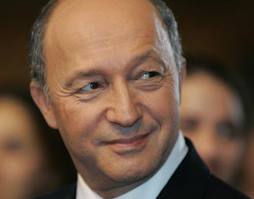 France will submit a resolution to the United Nations Security Council on Tuesday aimed at dismantling Syria’s chemical-weapon arsenal, seizing on an overture from Russia to head off military strikes against the regime of Bashar al-Assad.
France will submit a resolution to the United Nations Security Council on Tuesday aimed at dismantling Syria’s chemical-weapon arsenal, seizing on an overture from Russia to head off military strikes against the regime of Bashar al-Assad.
French Foreign Minister Laurent Fabius, speaking at a news conference, said the draft resolution would establish “consequences” for the regime if it fails to comply with the proposed program. He didn’t name the consequences, saying “all options remain on the table.”
He said the proposed resolution would also invoke Chapter 7, a clause that allows member states to use all possible means to enforce a resolution.
France will submit the draft resolution to the Security Council later Tuesday, a French official said. Paris aims to secure approval before the U.N. General Assembly starts Sept. 22, the official said.
“We don’t want to accept any delay tactics,” Mr. Fabius said. “We mustn’t fall into a trap.”
The announcement is a sign of how international efforts to address the crisis in Syria have shifted back to diplomacy after weeks of saber-rattling led by the U.S. and France that followed the Aug. 21 chemical attack on the outskirts of Damascus.
Both Paris and Washington have said they had collected evidence that the Assad regime was behind the attack, saying it killed nearly 1,500 people—allegations the regime has repeatedly rejected.
Together with the U.S., France has threatened in recent weeks to engage force in Syria, saying military strikes would help deter the Assad regime from using chemical weapons against civilians and rebel groups.
France’s push to dismantle the chemical arsenal under Chapter 7 could face resistance. European diplomats had secretly proposed a similar resolution to Moscow weeks ago, according to a French official. However, Moscow rejected the proposal, the official said, because Chapter 7 makes the resolution binding, and has been previously used to justify military intervention.
The French official said Paris considered its terms for the draft resolution “nonnegotiable.”
“Syrians must take immediate commitments,” Mr. Fabius said.
France’s proposed resolution comes after Russia said it is preparing a plan for Syria to hand over its stockpile of chemical weapons and put it under international control.
Russia, one of Syria’s closest allies, and one that wields veto power on the Security Council, has blocked previous resolutions aimed at punishing the Assad regime.
Russian officials said Tuesday that the idea of placing the Assad regime’s chemical arsenal under international control was “not quite a Russian initiative,” but stemmed from contacts with U.S. diplomats.
In Moscow, Russian Foreign Minister Sergei Lavrov said he hoped to present an “effective, clear, concrete” plan to the West. “For this purpose, contacts with the Syrian side are being conducted literally at this minute,” Mr. Lavrov told reporters.
Mr. Lavrov said the monitoring program would involve the U.N. Secretary General, the Organization for the Prohibition of Chemical Weapons, as well as members of the Security Council, which includes the U.S.
China, which has previously joined Russia in blocking U.N. resolutions against the Assad regime, welcomed Russia’s initiative.
“As long as the suggestion will ease tensions in Syria and solves the Syrian issue and safeguards peace in the region, the international community should give positive consideration to it,” Chinese Foreign Ministry spokesman Hong Lei said of the proposal at a regular press briefing.
WSJ

Leave a Reply
You must be logged in to post a comment.